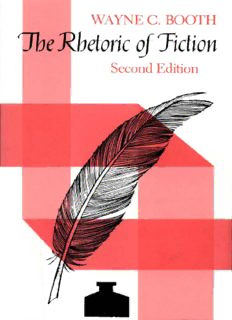Table Of ContentWAYNE C. BOOTH
Ihe Rhetoric of fiction
Second Edition
he first edition of The Rhetoric of Fiction transformed the criticism
of fiction and soon became a classic in the field. One of the most
widely used texts in fiction courses, it is a standard reference point in
advanced discussions of how fictional form works, how authors make
novels accessible, and how readers recreate texts, and its concepts
and terms—such as "the implied author," "the postulated reader,"
and "the unreliable narrator"—have become part of the standard
critical lexicon.
For this new edition Wayne C. Booth has written an extensive
Afterword in which he clarifies misunderstandings, corrects what
he now views as errors, and sets forth his own recent thinking about
the rhetoric of fiction. The other new feature is a Supplementary
Bibliography, prepared by James Phclan in consultation with the
author, which lists the important critical works of the past twenty
years—two decades that Booth describes as "the richest in the
history of the subject."
Praise for the first edition:
"Not many books can be called indispensable. This one can. . . .
Many people, reading this sane and cogent book, are going to feel
as if doors and windows had been opened."—Wallace Stegner,
American Scholar
"This is a major critical work which should be required reading
for everyone concerned in the academic study of prose fiction."
— David Lodge, (British) Modern Language Review
WAYNE-: C. BOOTH is the George M. Pullman Distinguished Service
Professor Emeritus at the University of Chicago. He is the author
of A Rhetoric of Irony, Modern Dogma and the Rhetoric of Assent,
Critical Understanding: The Powers and Limits of Pluralism, and
Now Don't Try to Reason with Me and is the editor of The Knowledge
Most Worth Having, all published by the University of Chicago Press.
The first edition of his The Rhetoric of Fiction received the Christian
Gauss Award (Phi Beta Kappa) and the David H. Russell Award for
Distinguished Research (National Council of Teachers of English).
The University <>t Chicago Press
ISBN D-ZZb-OLSSfi-fl
llllllllllllllllllllllllllllll 90000>
7he Rhetoric of fiction
Second Edition
7he Rhetoric
of fiction
Second Edition
BY WAYNE C. BOOTH
T HE U N I V E R S I TY OF C H I C A GO P R E SS
CHICAGO & LONDON
The University of Chicago Press, Chicago 60637
The University of Chicago Press, Ltd., London
© 1961, 1983 by The University of Chicago
All rights reserved. First edition 1961
Second edition 1983
Printed in the United States of America
04 03 02 01 7 89
Library of Congress Cataloging in Publication Data
Booth, Wayne C.
The rhetoric of fiction.
Bibliography: p.
Includes index.
1. Fiction—Technique. I. Title.
PN3355.B597 1982 808.3 82-13592
ISBN 0-226-06558-8 (pbk.)
This book is printed on acid-free paper.
Jo Jlonald Crane
Contents
Foreword to the Second Edition xi
Preface to the First Edition xiii
Acknowledgments xvii
PART I: ARTISTIC PURITY AND THE RHETORIC OF FICTION
I Telling and Showing 3
Authoritative "Telling" in Early Narration 3
Two Stories from the Decameron 9
The Author's Many Voices 16
II General Rules, I: 'True Novels Must Be Realistic" 23
From Justified Revolt to Crippling Dogma 23
From Differentiated Kinds to Universal Qualities 29
General Criteria in Earlier Periods 33
Three Sources of General Criteria: The Work, the
Author, the Reader 37
Intensity of Realistic Illusion 40
The Novel as Unmediated Reality 50
On Discriminating among Realisms 53
The Ordering of Intensities 60
III General Rules, II: "All Authors Should Be Objective*7 67
Neutrality and the Author's ''Second Self" 67
Impartiality and "Unfair" Emphasis 77
Impassibilité 81
Subjectivism Encouraged by Impersonal Techniques 83
vii
Contents viii
IV General Rules, III: 'True Art Ignores the Audience" 89
"True Artists Write Only for Themselves" 89
Theories of Pure Art 91
The "Impurity" of Great Literature 98
Is a Pure Fiction Theoretically Desirable? 109
V General Rules, IV: Emotions, Beliefs, and the Read-
er's Objectivity 119
"Tears and Laughter Are, Aesthetically, Frauds" 119
Types of Literary Interest (and Distance) 125
Combinations and Conflicts of Interests 133
The Role of Belief 137
Belief Illustrated: The Old Wives' Tale 144
VI Types oi Narration 149
Person 150
Dramatized and Undramatized Narrators 151
Observers and Narrator-Agents 153
Scene and Summary 154
Commentary 155
Self-Conscious Narrators 155
Variations of Distance 155
Variations in Support or Correction 159
Privilege 160
Inside Views 163
PART II: THE AUTHOR'S VOICE IN FICTION
VII The Uses of Reliable Commentary 169
Providing the Facts, Picture, or Summary 169
Molding Beliefs 177
Relating Particulars to the Established Norms 182
Heightening the Significance of Events 196
Generalizing the Significance of the Whole Work 197
Manipulating Mood 200
Commenting Directly on the Work Itself 205
VIII Telling as Showing: Dramatized Narrators, Reliable
and Unreliable 211
Description:The first edition of The Rhetoric of Fiction transformed the criticism of fiction and soon became a classic in the field. One of the most widely used texts in fiction courses, it is a standard reference point in advanced discussions of how fictional form works, how authors make novels accessible, an

